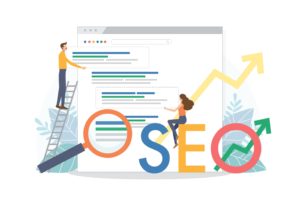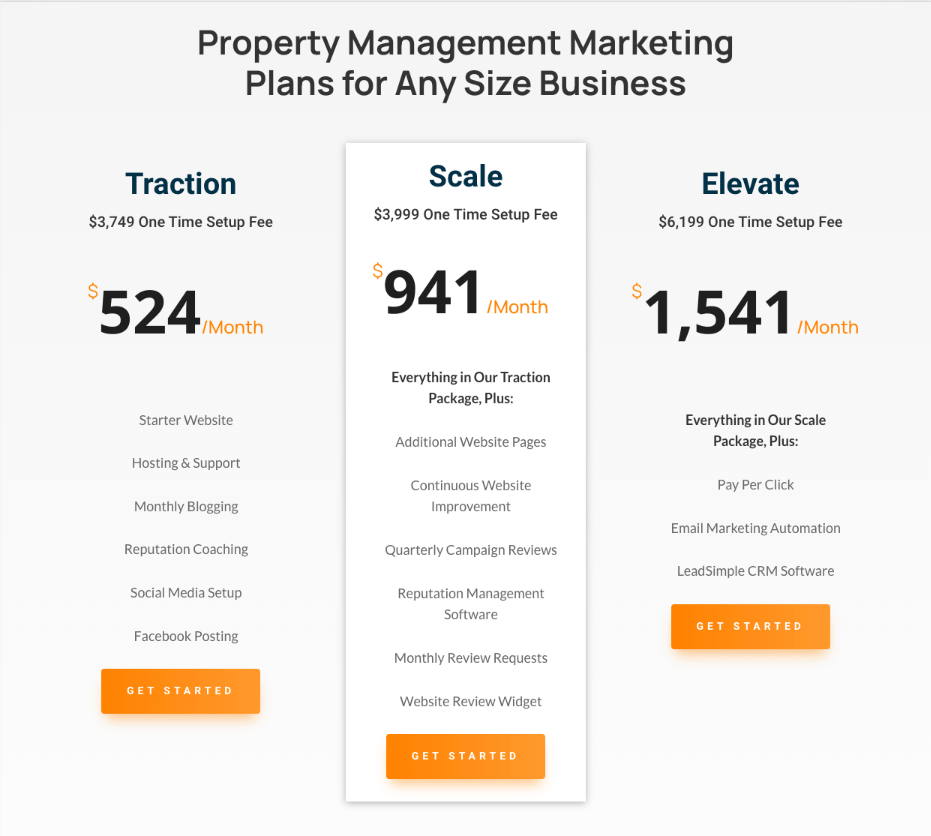Updated July 14th, 2022
SEO is a term that’s bandied about when we talk about marketing your property management company. It’s an acronym that touches every industry that advertises its services or tries to get attention online.
What does it mean and are you doing it right?
We’re going to find out by breaking down what you need to know about SEO and how you can be sure you’re getting the most from your marketing dollars when it comes to harnessing the power of Google and other search engines to drive business to your company.

SEO CAN HELP YOU GROW
What is Search Engine Optimization – or SEO?
Well, we know it’s crucial to growing your property management business, but what are we talking about exactly when we talk about SEO?
Search engine optimization (SEO) allows you to improve both the quality and quantity of website traffic to a website or a page online from search engines.
When we are sharing the different methods we use to increase SEO, we’re talking about the unpaid traffic your website receives, or the organic search results that are based on who is visiting your site and why. This doesn’t consider paid traffic.
By unpaid or organic results, we mean online searches. That could include search for images, videos, news, blogs, and other content.
At Fourandhalf, we’re always staying up to date on how search engines work. Your SEO actually depends on a number of ever-changing computer-generated algorithms that impact search engine results. Those algorithms can even affect what people search for, based on the terms they are using when they ask a question in a search box.
The more visitors we can drive to your site, the more business you’ll bring in.
To get those visitors to your site, we need to improve your search results. When someone types in “Austin property management,” for example, you’ll get better results when your company shows up on the first page of search results. If potential customers have to click through four pages of results, you’re not likely to be the first company they call.
This is why SEO is so important. So you can rank higher in search results and get more attention from potential customers.
At Fourandhalf, we’re always working on better Internet marketing ideas for property management companies. So we’ve spent some time putting together our best tips for increasing your SEO. A lot of what we recommend, of course, depends on your unique business goals and your market. It depends on where you are and where you want to go. But, you’ll find that many of these tips will fit into your marketing plan regardless of what you’re trying to do with your company.
Let’s jump in.

TIP 1: INCREASE SEO WITH AN APPETIZING LIST OF MENU ITEMS
Not much on your property management website is more basic than your menu.
Maybe you never gave it much thought. But, those menu items are actually pretty important. If someone arrives on your site and is confused or doesn’t immediately see what they’re looking for, it’s like that they’re going to go away.
That’s called bounce, and we don’t like it because it cancels out your SEO pretty dramatically.
The goal is to keep people on your website, so make sure the menu items are giving them some good options on where to go.
Your front page layout, particularly your menu items, needs to be clean, clear and simple.
We recommend that you have four or five key menu items on that front page so people know exactly where they need to go once they arrive at your website. Those menu items will depend on what exactly you’re doing, but they’re likely to look like this:
- Owners
- Tenants
- Property Management Services
- Realtor Referrals
Maybe you’ll have a menu item for your maintenance services if your property management company also does maintenance. Maybe you’ll have a tab for real estate sales if you do that, too.
- Owners
- Tenants
- Property Management Services
- Buy and Sell Real Estate
You could also consider putting your Blog tab on your menu items. Some of your current owners and customers may come to your site looking for your latest blog post. This will always help your SEO, so make it easy for visitors to find content like videos and blog articles.
- Owners
- Tenants
- Property Management Services
- Realtor Referrals
- Blog
Why do we care so much about the menu?
The purpose here is to increase your SEO by reducing your bounce rate and increasing the time spent on your site.
With a lot of different people coming to your property management website, you need to direct traffic and you need to do it quickly. Give those tenants, real estate agents, owners, and prospective clients easy directions.
A clean homepage and a user-friendly list of menu items will channel each visitor to the proper area of your site. Instead of leaving, they’ll spend more time there.
We see a lot of different menu items on property management websites, and that’s okay. Maybe you get a lot of free press in your community, so you want to have a Media tab. That’s fine. Or, you know that a lot of prospective tenants come to your site to look for their next home, so you have an Available Rentals tab on the menu bar. That’s okay, too.
You can have any menu item you want up there.
Just make sure your owners, tenants, real estate partners, and other potential new business parties can easily see where they need to go. Don’t let them get confused or frustrated. Make it easy for them to find the information they need on your website.
Your front page must be clear, clean, and easy for people to navigate.
TIP 2: MAKE IT MAKE SENSE: YOUR URL STRUCTURE
Another SEO pro tip that you may not have considered is your URL.
It’s an acronym that stands for Uniform Resource Locator. For our purposes, we need to know that a URL is simply the address of a unique web resource that’s found online.
If we dive any deeper into what a URL is and does, we’ll get into some tech-heavy territory. It’s not the same as your domain name, but your domain name is part of your URL.
Go to any website, and all of the language that comes after https:// is your URL.
You want to develop a strategic URL structure for each separate pages on your website. You want them to make sense. Bizarre characters, extra letters, and nonsensical phrasing will only throw people off and certainly they’ll be impossible to share.
A good URL that’s likely to increase your SEO will be consistent and descriptive.
Let’s look at an example.
If you are a property management company in Sacramento, your services landing page should have a URL like this:
mypropertymanager.com/sacramento-property-management
Similarly, your owner’s page should have a URL like this:
mypropertymanager.com/owner-services
When your URLs make sense, Google can find you faster. And when Google can find you faster, that means you get a significant and easy SEO boost.
No page on your site should have a bizarre URL that doesn’t make sense. We DON’T want to see this: mypropertymanager.com/46893-index.html

Sharing your URL becomes more casual and a lot easier when it makes sense. You could be in the middle of a conversation with a prospective tenant and suggest they visit a specific page on your site. A long and complicated URL will make that important. A short, relevant, and easy-to-remember URL will get your point made and allow you to share information easier.
WHY WE LOVE LANDING PAGES FOR SEO
We talk a lot about landing pages, and that’s because they do so much good for so many reasons.
They’re ideal for converting visitors to customers.
They’re an easy way to promote a new special or an expanded service.
They also help increase your SEO.
A landing page is designed to convert website visitors into actual leads. Your business opportunities flow from this page, so you have to make it outstanding.
A good landing page is consistent with your brand and the rest of the website, but instead of leaving people to wander around your website, it delivers a specific call to action and it gives prospects a reason to get in touch with you. This is where you can convert a prospect into a customer.
Thing of your landing page as your 24-hour internet salesperson who never needs a day off.
We’ve talked about landing pages in a number of different blogs and on videos and probably in our one-to-one conversations if you’ve ever contacted a member of the Fourandhalf team.
Here’s a review of why we love landing pages and what you absolutely need to have on them in order to make them effective in converting prospects AND driving up your SEO.
There are 6 items you absolutely must have on this page to outsell your competition and be more effective in attracting property management business.
- A Good Landing Page Title
- Seems obvious? Well, you’d be surprised at some of the landing pages we’ve seen without effective titles.
- Make sure the title reflects what you do and where you do it. If you’re a property management company in Sacramento, the title should be:
- Sacramento Property Management.
- It’s that simple.
- Make the title big and bold so it’s not easy to miss. Complement that title with a good background image that reflects where you are.
- Your Phone Number
- The goal of your landing page is to convince people to get in touch with you.
- Share your phone number early on the page and often.
- The phone number needs to be clearly visible. Don’t hide it in the text somewhere and don’t wait until the page footer to share your contact information.
- There’s no reason not to feature your phone number right beneath the title of your landing page. It’s unmistakable and it’s easy for potential clients to immediately call you. Then, sprinkle it elsewhere on the page.
- Contact Form
- The Contact Form is perhaps the most critical part of your landing page. It gives you the opportunity to collect information from your prospects. Not only will you get their name and email address as well as a phone number, you’ll also invite them to share some information about what they’re looking for. That will help you open a conversation.
- Put the Contact Form below the fold, and consider using it in a few places, just the like the phone number. Give landing page visitors plenty of opportunities to complete that form and get in touch.
- Value Propositions
- Your landing page needs some value propositions, but the formatting is often just as important as the content.
- We want to keep text blocks to a minimum on your landing page.
- Make use of white space and list between 4 and 6 reasons your company is the best. Make yourself shine so you can effectively sell your property management services to a prospective client.
- Put your best value propositions out there and list them clearly.
- Testimonials and Reviews
- Include testimonials from Google and Yelp. You can also use any feedback you’ve received from clients or tenants.
- At Fourandhalf, we work with Reputation.com to install widgets on landing pages that allow visitors to see an ongoing update of the reviews that have been captured for your company.
- By including a testimonial or a review, you’re adding to the authority of your company. That’s going to increase your SEO and your business growth.
- Special Offer
- Also known as The Hook, your special offer will keep people on your page longer. It will also inspire them to get in touch with you.
- Ask your visitors to mention the special offer that they found on your landing page when they contact you.
- This can be anything. Some of the most effective offers we’ve seen are things like half off the first month’s management fee or a reduced leasing fee or an eviction guarantee.
TIP 3: THINK ABOUT INCLUDING A PRICING PAGE ON YOUR WEBSITE
Here’s why a pricing page works so well for SEO:
It Drives Traffic
What’s one of the first questions you get from people who are considering your property management services? They want to know what it costs. They need to know how much they’ll have to pay for leasing and management fees when they work with you.
When you provide that information on your website, they’ll go directly to that page to do some budgeting and compare your prices to others they may have found.
Pricing pages make you look transparent, which is great for business. It also cuts down on the awkward conversation around pricing that you may have to have with prospects. You won’t have to worry about the price negotiations when someone actually calls you – they’ve likely already seen it on your website.
The SEO benefits are outstanding. You can attract more people to your website when they know your pricing information is listed there. And, it will be more than 20 seconds to digest, so you’ll keep them on your site longer. Google and other search engines love that. They’ll take notice and you’ll rank higher.
Think about creating a pricing chart that might easily display your different service levels and their costs
This makes it easy for your customers to make comparisons.
Keep it simple. If you have a lot of exceptions or if you’re willing to negotiate based on the size of a portfolio or a referral, say that in your pricing page. Don’t try to make a more detailed graphic than you need. People want to understand what they’re looking at.
Don’t be afraid to help people choose a pricing plan.
You can use a simple slogan on your pricing chart like:
“Best Value” or “Most Popular Option”
Don’t offer 10 different pricing structures. Keep the choices limited to three or four. This will be more manageable for your website and easily digestible for owners and investors who are there to make a buying decision.
The Call to Action has a place on a pricing page as well. This is another great conversion tactic, and if you get people who move along the process this way, you’ll not only gain new business, you’ll increase your SEO.
The call to action (CTA) button, size, and wording matter. Leave a large and yellow button on the bottom of the pricing page that says “Choose Now” or “Join Now” or even “Contact Us for Our Best Rates.”
WHAT HAVE WE LEARNED HERE?
SEO is every bit an art and a science. The way in which Google measures who should rank there is sometimes a mystery. This is why you need help staying one step ahead of the latest algorithm.
You can get started improving your SEO capabilities right now with the tips we’ve provided. Then, we can help you take things a bit further. If you have any questions or you need any help putting these plans into action, you know you can always contact us at Fourandhalf.


